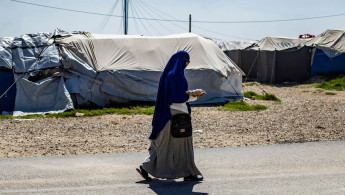Most British women in NE Syria are trafficking victims: NGO
The women, some who were as young as 12 when they were taken to Syria, were trafficked by the Islamic State group (IS) and subjected to sexual and other forms of exploitation, the UK-based NGO's investigation found.
It accused the British government of "systematically failing" them through policies of blanket citizenship stripping, refusing repatriation and withholding basic consular assistance.
UK authorities have long grappled with how to handle the estimated 900 Britons who travelled to Syria and Iraq to join the conflict there.
Although hundreds have returned to the UK - with dozens then prosecuted - the government has revoked more than 150 people's citizenship and an unconfirmed number remain in the hands of pro-Western Kurdish militias in northeast Syria.
Shamima Begum, who was just 15 when she and two other schoolgirls from London travelled to Syria to join the jihadists, is the most high-profile case.
She was stripped of her citizenship in 2019, and recently lost a long-running legal bid to return to appeal the decision.
Reprieve, which estimates around 25 British adults and 34 UK children are still being held, urged London to reverse its policies.
"The complex dynamics of the situation of British women and children detained in NES (northeast Syria) can only be properly dealt with by the UK authorities when the families are repatriated to Britain," it said.
"It is wrong to suggest that the UK can abandon these victims of trafficking."
Siobhan Mullally, UN Special Rapporteur on the issue, wrote in a foreword to the report that Britain was failing to meet slavery and human trafficking commitments.
|
|
"Urgent protection gaps now exist in relation to UK nationals," she wrote.
'Blind-spot'
The NGO's probe relied on extensive research conducted in the region since 2017, including face-to-face interviews with detainees in Syrian camps as well as discussions with their relatives.
At least 63 percent of the British women and children there are victims of trafficking, either transported as children, coerced into travelling there or kept and moved internally against their will, Reprieve said.
It concluded that IS used similar tactics to child sex trafficking gangs, grooming and recruiting hundreds of women and girls who were subsequently forced into marriage, sexual slavery and domestic servitude.
In another report foreword Andrew Mitchell, a lawmaker from Britain's ruling Conservatives and a former international development minister, accused his government of having a "blind-spot" on the issued.
"We cannot wash our hands of these Britons, abandoning them in ungoverned space," he wrote.
The government noted it would not use gender or age in national security risk assessments and that those who fought for or supported IS should face justice in what it calls the most "appropriate" jurisdiction.
"Our priority is to ensure the safety and security of the UK," a government spokeswoman said, adding that it has worked to repatriate British children "subject to national security concerns".
Follow us on Facebook, Twitter and Instagram to stay connected





 Follow the Middle East's top stories in English at The New Arab on Google News
Follow the Middle East's top stories in English at The New Arab on Google News
![Israeli forces ordered bombed Gaza's Jabalia, ordering residents to leave [Getty]](/sites/default/files/styles/image_330x185/public/2176418030.jpeg?h=a5f2f23a&itok=_YGZaP1z)

